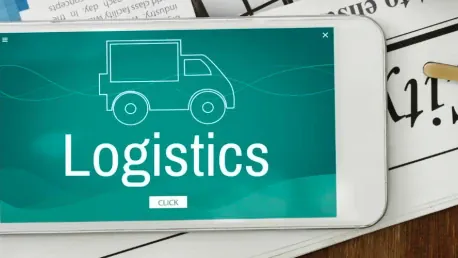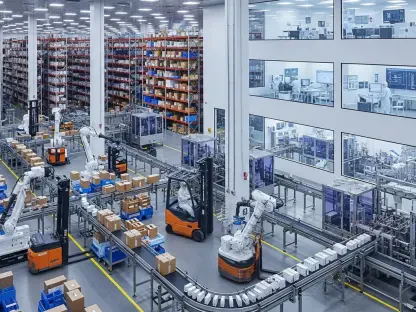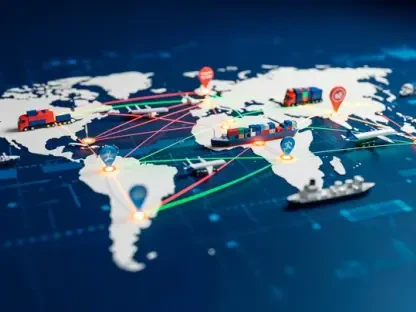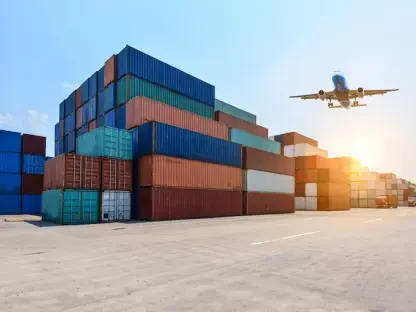The logistics industry in 2024 stands at a transformative juncture, driven by rapid technological advancements and robust sustainability initiatives that are reshaping the landscape. These innovations are focused on enhancing efficiency, reducing costs, and improving customer satisfaction. The convergence of these trends is leading to smarter, faster, and more eco-friendly operations, fundamentally altering how logistics functions at every level. This comprehensive analysis delves into the key technological and sustainable practices that are set to redefine the industry, offering companies a competitive edge in an increasingly complex market.
Technological Advancements in Logistics
Automation and Robotics
Automation is fundamentally altering logistics operations, particularly in warehouses and distribution centers, where robotic systems are taking over tasks that were traditionally performed by humans. Technologies such as Automated Guided Vehicles (AGVs) and drones are revolutionizing the way goods are sorted, packed, and transported, leading to significant improvements in speed and accuracy. By reducing human error, these systems contribute to more efficient processes and lower operational costs, making logistics operations more reliable and streamlined.
Investments in AI-powered software for route optimization are also on the rise, providing companies with tools to achieve quicker delivery times and reduce vehicle wear and tear. These advanced systems use real-time data to make informed decisions about the best routes for delivery, ensuring that goods reach their destinations as quickly and efficiently as possible. Additionally, this technology aids in real-time inventory management, allowing companies to better allocate resources and make more informed decisions. The overall result is a more efficient supply chain with reduced costs and increased productivity.
Advanced Analytics and Big Data
Advanced analytics and big data have become essential tools in logistics decision-making, offering insights that can drive efficiency and innovation. Companies are leveraging large datasets to forecast demand more accurately, optimize routes, and assess risks, which is especially crucial for managing international freight transport services. Predictive analytics enables businesses to anticipate future needs and adjust stock levels accordingly, minimizing wastage and streamlining operations. This not only enhances operational efficiency but also improves customer service by providing faster response times.
Moreover, the use of big data is enhancing data security through improved access controls and audit logs, fostering greater trust between companies and their partners. These measures ensure that sensitive information is protected, enabling smoother collaborations and more secure operations. As companies continue to harness the power of data, they are better positioned to adapt to changing market conditions and maintain a competitive edge.
The Internet of Things (IoT)
IoT technologies are revolutionizing real-time tracking and monitoring of shipments, providing unprecedented levels of visibility throughout the supply chain. This is particularly important for sensitive goods that require specific conditions during transit. IoT devices enable companies to monitor vehicle conditions, enhancing safety through proactive maintenance and preventing breakdowns. These devices collect and transmit data about various parameters, such as temperature and humidity, ensuring that goods are transported under optimal conditions.
In smart factories and warehouses, IoT facilitates equipment and inventory monitoring, ensuring that materials are available exactly when needed. This real-time visibility allows companies to optimize their supply chains, reducing delays and operational hiccups. By integrating IoT technologies into their operations, companies can achieve greater efficiency and reliability, ultimately leading to smoother logistics processes and better customer satisfaction.
Sustainable Practices and Green Logistics
Electric and Autonomous Vehicles
Electric and autonomous vehicles are leading the way in green logistics, offering substantial reductions in emissions and enhanced operational efficiencies. Electric vehicles (EVs) contribute significantly to a decreased carbon footprint as they produce no tailpipe emissions, making them an environmentally friendly option for logistics operations. Autonomous vehicles promise fuel efficiency and better route optimization, translating to substantial operational gains and lower environmental impact.
Many companies are now investing in EV fleets and building the necessary infrastructure, such as charging stations, to support their broader adoption. The advancements in GPS and sensor technologies ensure that autonomous vehicles operate safely and efficiently, reducing delivery times and promoting a greener logistics environment. By integrating these cutting-edge technologies into their operations, companies are not only enhancing their sustainability efforts but also positioning themselves as leaders in the industry.
Supply Chain Decarbonization
Decarbonization of supply chains is a key initiative in reducing the environmental impact of freight operations. Companies are increasingly focusing on sustainable sourcing and energy-efficient transport modes to minimize their carbon footprint. This includes the broader use of renewable energy and optimized load planning, which are becoming prevalent practices in the industry. By adopting these sustainable practices, companies are not only reducing their environmental impact but also aligning with consumer expectations for eco-friendly logistics services.
Technological solutions such as blockchain are being employed to identify carbon reduction opportunities within supply chains. Blockchain’s transparency and traceability capabilities assist companies in making better emission reduction decisions, ensuring that they can accurately track and report their sustainability efforts. Furthermore, regulatory incentives and climate targets are driving innovation, pushing firms to align with stringent sustainability standards and consumer demands. As companies continue to prioritize green logistics, they are better positioned to meet regulatory requirements and gain a competitive edge in the market.
Strategic Shifts and Market Adaptation
Efficiency and Cost Reduction
The logistics industry is strategically shifting towards methods that ensure efficiency and cost reduction, leveraging both technology and sustainable practices. By integrating advanced technologies such as automation, AI, and IoT, companies are streamlining their operations, enhancing productivity, and minimizing operational costs. These technologies enable faster delivery times, reduce errors, and improve overall operational efficiency, leading to better customer satisfaction.
Strategically, companies are also focusing on workforce development, investing in training programs that equip employees to manage and use new technologies effectively. This holistic approach not only drives efficiency but also creates a knowledgeable workforce capable of adapting to rapid technological changes. By combining technological innovation with workforce development, companies can achieve sustainable growth and maintain a competitive edge in the evolving logistics landscape.
Enhancing Customer Satisfaction
In 2024, the logistics industry is at a pivotal point, driven by rapid technological advances and strong sustainability efforts that are transforming the field. These innovations aim to boost efficiency, cut costs, and enhance customer satisfaction. The convergence of these trends is creating smarter, faster, and greener operations, fundamentally changing logistics at every level. For instance, automation and AI are streamlining supply chains, while blockchain is enhancing transparency and security. Additionally, the use of electric vehicles and renewable energy sources is reducing the industry’s carbon footprint. This comprehensive analysis explores the key technological advancements and sustainable practices poised to redefine the sector. By adopting these innovations, companies can gain a competitive advantage in an increasingly intricate market. Overall, the future of logistics in 2024 and beyond is set to be more efficient, cost-effective, and environmentally friendly, offering significant benefits for companies ready to embrace these changes.









